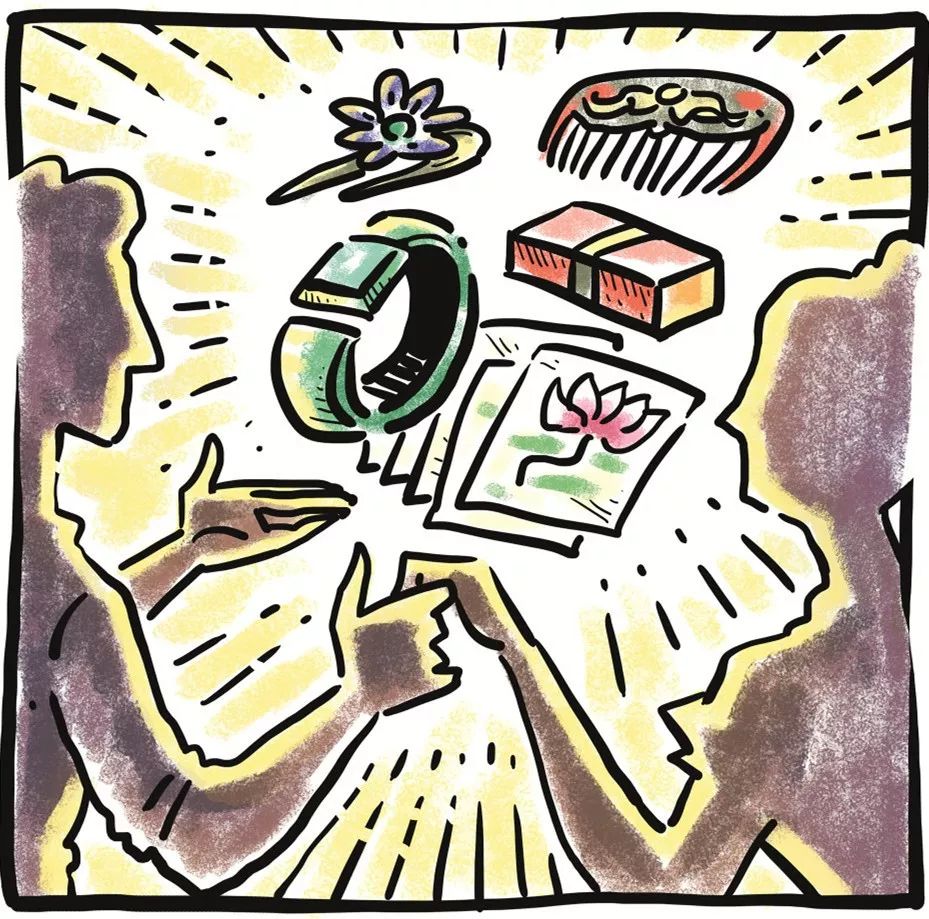
Photo/ Xiao Zhenduo
Text/Xiao Yao
Published in China News Weekly on December 2, 2019, No. 926
In the American drama "Femme Fatale", 18-year-old Tommy gives his beloved lady, his mother's girlfriend Simona, a plastic cartoon watch as a gift, which is disliked by 50-year-old Simone. Later, Tommy overspent his living expenses for a year, gave her a brooch studded with diamonds, and said, "A woman like you deserves the best", Simone knew that young Tommy could not afford to send the real thing, and accepted the "fake" brooch, and exaggeratedly praised "stunning" in her mouth!"
Lovers exchange gifts is a formal confession, through this gift, to each other to offer their love, hope that their carefully collected treasures, and each other's desires are in line with each other's desires. Gifts are a way to touch, to feel: you will touch what I have touched, and you will connect us with the skin of a third party. For example, Baoyu gave Dai Yu two half new and unused handkerchiefs, and Dai Yu gave Bao Yu a hand-sewn purse. On the contrary, any purity-loving teaching forbids touching a donation or a gift received with his hands; when a Buddhist cuts his hair as a monk, his personal belongings and robes are given to the monk on the confession; the monk cannot use his hands, but only a staff to receive these items; henceforth all offerings to him—what he depends on—must be placed on the offering, on the floor, or on a folding fan.
In O Henry's novel Maggie's Gift, Christmas arrives, the husband sells his ancestral gold watch, buys his wife a comb made of "pure tortoiseshell with jewelry on the side", the wife sells her long waterfall-like hair, buys a white gold bracelet for her husband, they give up their most precious things, and the gifts become impractical but full of emotional significance.
In contrast, McKinnani's novel Simple Gift, more than a hundred years later, seems to be a tribute to O.Henry, but also full of modernity, the heroine Lola is a down-and-out singer, and her predecessors are either drugged or drunk, and only fall in love again when she breaks through some fame by singing. She cherished her first Christmas with her boyfriend Jeffrey, but when she returned home after a long journey back to the show, it was nearly midnight, and no matter how much she wanted to sleep, she was well aware that the current environment did not allow her to sleep. She changed into a black polyester skirt and a pink Spandex elastic top, ready to "wake up all night with my baby." Unexpectedly, her boyfriend saw that she was very tired, felt sorry for her, wanted her to sleep well, and he had already taken two sleeping pills. He barely held out for half an hour, but finally took a nap. Fully awake, she had to brush the kitchen, count the lights on the opposite floor, and think about life. She managed to imagine spending her whole life spending Christmas with Jeffrey, imagining herself as new and strange as a molting snake. That was the gift she wanted to give him: a girl with a renewed look.
There is a story in Zhou Xiaofeng's novel "Angel on the Tip of the Needle": the heroine has two suitors, one is a painter, giving her a book bound by herself, punching holes on the sides, tied with twine thread, and on a stack of white paper with a slight hardness, he draws a flower in succession, from the bud to the process of full bloom. Snap your thumb and index finger to the book, quickly release the page, and the gray rose in the sketch blooms in front of you with its layers of light and dark transitions. The other was the cook, who gave her a rose carved from a radish, hard in texture and rich in layers, but with no roots and no stems. They float on the surface of the water like a water lily. And my girlfriend commented that their flowers are fake, and only the flower years she grew up with her are real.